Published comments from musicians, writers, colleagues and friends
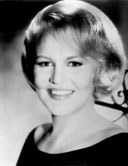
Yesterday
Andre Previn, a longtime friend and fan, said, “For the singing of popular songs, Peggy Lee was about as good as you can get, with the exception of Billie Holiday. When she did some of those unbelievably slow ballads, she would still swing like a house afire. Her sense of rhythm was unbeatable, sensational. And when she sang a song of unrequited love, she really got to you.” (
Boston Globe, 1/23/02)
Jazz impresario
George Wein, who arranged her last Carnegie Hall concert, in June 1995, remembered that, despite the wheelchair, her singing was “magical. She sang for over an hour. You could hear a pin drop, except when she finished a song and the audience roared.” (
Baltimore Sun, 1/23/02)
“She had staying power, she had tremendous taste in the songs she chose to sing and she genuinely loved to entertain, to sign autographs, to make contact with people,” said
Bobby Short, the prominent cabaret singer, speaking from his Manhattan apartment. “She was very persnickety about which jazz musicians played with her and practically everything else that went into a show,” said Short, who marveled at her stage productions, particularly in one of her signature numbers, the sultry “Fever.” “She had spotlights here and spotlights there, but she had this notion that she wanted to start with a single pin light focused on her fingers snapping, and that’s how the piece opened,” recalled Short. “What a sensational effect.” (C
hicago Tribune, 1/23/02 and 1/27/02)
Added
Dee Dee Bridgewater, one of many jazz vocalists profoundly influenced by Lee, “The songs that she recorded, like ‘Fever,’ became a part of American pop history. You listened to that phrasing of hers,” said Bridgewater, speaking from her Las Vegas home, “and you knew immediately that she was one of the great jazz singers.” (
Chicago Tribune, 1/23/02)
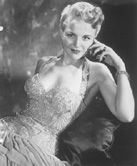
To
Tony Bennett, “Peggy Lee was the female Frank Sinatra,” the singer said in a statement. “She was the epitome of popular jazz singing and a wonderful songwriter as well.” (
Chicago Tribune, 1/23/02)
Connie Evingson, another Twin Cities vocalist, has been performing “Fever: A Tribute to Peggy Lee” since 1997 and will perform it next weekend at the Illusion Theater in Minneapolis. “I love her understated style, an approach to music that is not conscious or calculated but comes from who we are,” Evingson said. She also came to admire Lee as “a prolific songwriter at a time when that wasn’t very common,” an artist who was “endlessly creative, well-rounded and persistent” and who triumphed over considerable adversity. (
Minneapolis Star-Tribune, 1/23/02)
Besides being a singer, she was also a gifted lyricist, composer and musical innovator, says longtime friend
Gene DiNovi, a veteran piano man who worked for Miss Lee in the 1960s. “She was someone who never sang a note out of tune, or a note out of time,” says Mr. DiNovi, 73, who lives in Toronto. “She was one of the few performers who was a complete musician who became popular, which is a rarity. In other words, most people who are big stars are not necessarily musicians. She was. Her greatest skill — like all truly great singers — was her ability to communicate, to generations of listeners.” (
Toronto Globe & Mail, 1/23/02)
Jazz singer
Cleo Laine said Lee “came from a big-band era and knew how to swing. She knew how to sing on the beat when necessary. A lot of people don’t know how to do that. Her simplicity had a lot of nuances that other people just couldn’t grasp, that they just couldn’t imitate to save their lives,” Laine said Tuesday. (
Los Angeles Times, 1/23/02)
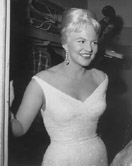 Diana Krall
Diana Krall, one of the leading singers in jazz today, offered similar praise. “I love everything about her: her elegance, her wit. And she is one of the greatest influences in what I do as an artist,” Krall said in a statement released Tuesday. (
Los Angeles Times, 1/23/02)
“She was an iconic singer, an exceptional musician and composer. Peggy was incredible.” (singer
Jane Monheit,
Entertainment Weekly, 2/8/02)
“When I was a 17-year-old college freshman in Boston in 1943, one of the local, late-evening disc jockeys had a ritual. Every weeknight, just past 11:30, he played Peggy Lee’s recording of ‘Where or When,’ with the Benny Goodman Trio. The tempo was unhurried, thoughtful, rich with feeling and promise. The singer seemed to be singing directly to me, and in our crowded dormitory room we sat, eyes closed, each of us alone with our hopeful dreams. She was something special.” (film critic
Charles Champlin,
Los Angeles Times, 1/27/02)
Bobbi Rogers of Durham, one of Connecticut’s finest jazz divas and big-band singers, never met or even saw Lee in a live performance. Nonetheless, she feels a special bond with Lee that goes back to her childhood. “I’ve always loved Peggy Lee since I was a kid and my grandfather would give me a quarter for my allowance, and I would go buy one of her 78s in a record store in New London. As kids in grammar school in our music class, we’d have to sing a song. I’d get up and sing a Peggy Lee song. Her melodic way of doing ballads and her phrasing were so great. It seemed unusual at that time to hear someone do something so lyrical,” Rogers says. (
Hartford Courant, 1/23/02)
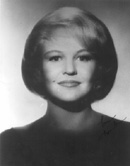
“She had the best sense of timing of any singer,” says
Jonathan Schwartz, longtime host on WNEW, WQEW, WNYC and XM Satellite Radio. “She was never ahead or behind. She made listeners feel comfortable.” To illustrate her musical skill, Schwartz cites several lesser-known songs, including “When the World Was Young,” “I’m a Fool to Want You,” from an early Capitol LP, and “Do I Love You,” from an LP with George Shearing. “You play them,” he says, “and they make you think, ‘She’s the best.’ Now in an absolute sense, she was not. She was not Ella. But when you listen to these songs, done in such a quiet, reflective, natural way, that’s what they make you think.” If she wasn’t the best, she was as close as it gets. “Ella could sing the impossible,” says Schwartz. “Peggy Lee could imply the impossible.” (
New York Daily News, 2/3/02)
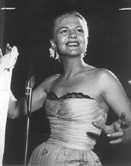
“I usually don’t get sad about the death of people who led full lives. But I’m sad about Peggy Lee. She represents an era that is leaving us, one where vocals were king, and I honestly can’t think of a better vocalist in that jazz-pop crooning style. What made her so good was that she interpreted and delivered songs with such a complex and dense range of emotions. She would mix in a sardonic sense of humor and back-phrase it, and with a smile or a cock of the head, completely turn the lyric on its head… I view her as my finest teacher of vocals.” (
k.d. lang,
Time, 1/27/02)
“Her economy of expression was just astonishing,” says noted jazz writer
Gary Giddins, author of “Bing Crosby: A Pocketful of Dreams — The Early Years” and columnist for The Village Voice. “As she developed her style, she pared away everything…. There aren’t a lot of singers who can pull that off. When I hear singers who are all over the place, and their time is terrible, I register the idea that somebody should send them a Peggy Lee CD.” (USA Today, 1/23/02)
Adds songwriter/producer
Jerry Leiber, who with partner Mike Stoller crafted many songs for Lee: “I told Mike that when I was 10, I bought my first phonograph record and it was Peggy Lee. I was mesmerized by her voice then, and I’m still mesmerized.” (
USA Today, 1/23/02)
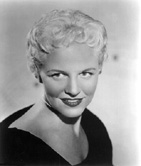 Shirley Horn
Shirley Horn, the Grammy-winning Washington singer and pianist, cites Lee as a major influence. “She had that voice, that sound, and she had the glamour,” Horn said yesterday. She recalled her first encounter with the platinum-blond singer many years ago at the Shoreham’s Blue Room. “It was dark, and when they turned the light on her, it was like the moon came out,” Horn reported. (
Washington Post, 1/23/02)
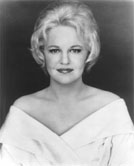
“She was never part of any kind of fashion,” said jazz critic
Nat Hentoff. “She never engaged in pyrotechnics. She was subtle and enticing in contrast with the belters who show off everything but their musicianship. She had some of [Maurice] Chevalier’s ability to connect with the audience to make them think she was singing just to them.” (
Los Angeles Times, 1/23/02)
Lee’s most lasting influence, jazz critic
Nat Hentoff said yesterday, was the fact that she could be both a pop and a jazz singer. “Her main quality was a marvelous sense of subtlety. She never overpowered you,” he said. Hentoff’s final comment seemed an appropriate epitaph: “You could hear her voice after it stopped.” (B
altimore Sun, 1/23/02)
Published obituaries and tributes
Peggy Lee’s memorial service, held February 2, 2002
 Yesterday Andre Previn, a longtime friend and fan, said, “For the singing of popular songs, Peggy Lee was about as good as you can get, with the exception of Billie Holiday. When she did some of those unbelievably slow ballads, she would still swing like a house afire. Her sense of rhythm was unbeatable, sensational. And when she sang a song of unrequited love, she really got to you.” (Boston Globe, 1/23/02)
Jazz impresario George Wein, who arranged her last Carnegie Hall concert, in June 1995, remembered that, despite the wheelchair, her singing was “magical. She sang for over an hour. You could hear a pin drop, except when she finished a song and the audience roared.” (Baltimore Sun, 1/23/02)
“She had staying power, she had tremendous taste in the songs she chose to sing and she genuinely loved to entertain, to sign autographs, to make contact with people,” said Bobby Short, the prominent cabaret singer, speaking from his Manhattan apartment. “She was very persnickety about which jazz musicians played with her and practically everything else that went into a show,” said Short, who marveled at her stage productions, particularly in one of her signature numbers, the sultry “Fever.” “She had spotlights here and spotlights there, but she had this notion that she wanted to start with a single pin light focused on her fingers snapping, and that’s how the piece opened,” recalled Short. “What a sensational effect.” (Chicago Tribune, 1/23/02 and 1/27/02)
Added Dee Dee Bridgewater, one of many jazz vocalists profoundly influenced by Lee, “The songs that she recorded, like ‘Fever,’ became a part of American pop history. You listened to that phrasing of hers,” said Bridgewater, speaking from her Las Vegas home, “and you knew immediately that she was one of the great jazz singers.” (Chicago Tribune, 1/23/02)
Yesterday Andre Previn, a longtime friend and fan, said, “For the singing of popular songs, Peggy Lee was about as good as you can get, with the exception of Billie Holiday. When she did some of those unbelievably slow ballads, she would still swing like a house afire. Her sense of rhythm was unbeatable, sensational. And when she sang a song of unrequited love, she really got to you.” (Boston Globe, 1/23/02)
Jazz impresario George Wein, who arranged her last Carnegie Hall concert, in June 1995, remembered that, despite the wheelchair, her singing was “magical. She sang for over an hour. You could hear a pin drop, except when she finished a song and the audience roared.” (Baltimore Sun, 1/23/02)
“She had staying power, she had tremendous taste in the songs she chose to sing and she genuinely loved to entertain, to sign autographs, to make contact with people,” said Bobby Short, the prominent cabaret singer, speaking from his Manhattan apartment. “She was very persnickety about which jazz musicians played with her and practically everything else that went into a show,” said Short, who marveled at her stage productions, particularly in one of her signature numbers, the sultry “Fever.” “She had spotlights here and spotlights there, but she had this notion that she wanted to start with a single pin light focused on her fingers snapping, and that’s how the piece opened,” recalled Short. “What a sensational effect.” (Chicago Tribune, 1/23/02 and 1/27/02)
Added Dee Dee Bridgewater, one of many jazz vocalists profoundly influenced by Lee, “The songs that she recorded, like ‘Fever,’ became a part of American pop history. You listened to that phrasing of hers,” said Bridgewater, speaking from her Las Vegas home, “and you knew immediately that she was one of the great jazz singers.” (Chicago Tribune, 1/23/02)
 To Tony Bennett, “Peggy Lee was the female Frank Sinatra,” the singer said in a statement. “She was the epitome of popular jazz singing and a wonderful songwriter as well.” (Chicago Tribune, 1/23/02)
Connie Evingson, another Twin Cities vocalist, has been performing “Fever: A Tribute to Peggy Lee” since 1997 and will perform it next weekend at the Illusion Theater in Minneapolis. “I love her understated style, an approach to music that is not conscious or calculated but comes from who we are,” Evingson said. She also came to admire Lee as “a prolific songwriter at a time when that wasn’t very common,” an artist who was “endlessly creative, well-rounded and persistent” and who triumphed over considerable adversity. (Minneapolis Star-Tribune, 1/23/02)
Besides being a singer, she was also a gifted lyricist, composer and musical innovator, says longtime friend Gene DiNovi, a veteran piano man who worked for Miss Lee in the 1960s. “She was someone who never sang a note out of tune, or a note out of time,” says Mr. DiNovi, 73, who lives in Toronto. “She was one of the few performers who was a complete musician who became popular, which is a rarity. In other words, most people who are big stars are not necessarily musicians. She was. Her greatest skill — like all truly great singers — was her ability to communicate, to generations of listeners.” (Toronto Globe & Mail, 1/23/02)
Jazz singer Cleo Laine said Lee “came from a big-band era and knew how to swing. She knew how to sing on the beat when necessary. A lot of people don’t know how to do that. Her simplicity had a lot of nuances that other people just couldn’t grasp, that they just couldn’t imitate to save their lives,” Laine said Tuesday. (Los Angeles Times, 1/23/02)
To Tony Bennett, “Peggy Lee was the female Frank Sinatra,” the singer said in a statement. “She was the epitome of popular jazz singing and a wonderful songwriter as well.” (Chicago Tribune, 1/23/02)
Connie Evingson, another Twin Cities vocalist, has been performing “Fever: A Tribute to Peggy Lee” since 1997 and will perform it next weekend at the Illusion Theater in Minneapolis. “I love her understated style, an approach to music that is not conscious or calculated but comes from who we are,” Evingson said. She also came to admire Lee as “a prolific songwriter at a time when that wasn’t very common,” an artist who was “endlessly creative, well-rounded and persistent” and who triumphed over considerable adversity. (Minneapolis Star-Tribune, 1/23/02)
Besides being a singer, she was also a gifted lyricist, composer and musical innovator, says longtime friend Gene DiNovi, a veteran piano man who worked for Miss Lee in the 1960s. “She was someone who never sang a note out of tune, or a note out of time,” says Mr. DiNovi, 73, who lives in Toronto. “She was one of the few performers who was a complete musician who became popular, which is a rarity. In other words, most people who are big stars are not necessarily musicians. She was. Her greatest skill — like all truly great singers — was her ability to communicate, to generations of listeners.” (Toronto Globe & Mail, 1/23/02)
Jazz singer Cleo Laine said Lee “came from a big-band era and knew how to swing. She knew how to sing on the beat when necessary. A lot of people don’t know how to do that. Her simplicity had a lot of nuances that other people just couldn’t grasp, that they just couldn’t imitate to save their lives,” Laine said Tuesday. (Los Angeles Times, 1/23/02)
 Diana Krall, one of the leading singers in jazz today, offered similar praise. “I love everything about her: her elegance, her wit. And she is one of the greatest influences in what I do as an artist,” Krall said in a statement released Tuesday. (Los Angeles Times, 1/23/02)
“She was an iconic singer, an exceptional musician and composer. Peggy was incredible.” (singer Jane Monheit, Entertainment Weekly, 2/8/02)
“When I was a 17-year-old college freshman in Boston in 1943, one of the local, late-evening disc jockeys had a ritual. Every weeknight, just past 11:30, he played Peggy Lee’s recording of ‘Where or When,’ with the Benny Goodman Trio. The tempo was unhurried, thoughtful, rich with feeling and promise. The singer seemed to be singing directly to me, and in our crowded dormitory room we sat, eyes closed, each of us alone with our hopeful dreams. She was something special.” (film critic Charles Champlin, Los Angeles Times, 1/27/02)
Bobbi Rogers of Durham, one of Connecticut’s finest jazz divas and big-band singers, never met or even saw Lee in a live performance. Nonetheless, she feels a special bond with Lee that goes back to her childhood. “I’ve always loved Peggy Lee since I was a kid and my grandfather would give me a quarter for my allowance, and I would go buy one of her 78s in a record store in New London. As kids in grammar school in our music class, we’d have to sing a song. I’d get up and sing a Peggy Lee song. Her melodic way of doing ballads and her phrasing were so great. It seemed unusual at that time to hear someone do something so lyrical,” Rogers says. (Hartford Courant, 1/23/02)
Diana Krall, one of the leading singers in jazz today, offered similar praise. “I love everything about her: her elegance, her wit. And she is one of the greatest influences in what I do as an artist,” Krall said in a statement released Tuesday. (Los Angeles Times, 1/23/02)
“She was an iconic singer, an exceptional musician and composer. Peggy was incredible.” (singer Jane Monheit, Entertainment Weekly, 2/8/02)
“When I was a 17-year-old college freshman in Boston in 1943, one of the local, late-evening disc jockeys had a ritual. Every weeknight, just past 11:30, he played Peggy Lee’s recording of ‘Where or When,’ with the Benny Goodman Trio. The tempo was unhurried, thoughtful, rich with feeling and promise. The singer seemed to be singing directly to me, and in our crowded dormitory room we sat, eyes closed, each of us alone with our hopeful dreams. She was something special.” (film critic Charles Champlin, Los Angeles Times, 1/27/02)
Bobbi Rogers of Durham, one of Connecticut’s finest jazz divas and big-band singers, never met or even saw Lee in a live performance. Nonetheless, she feels a special bond with Lee that goes back to her childhood. “I’ve always loved Peggy Lee since I was a kid and my grandfather would give me a quarter for my allowance, and I would go buy one of her 78s in a record store in New London. As kids in grammar school in our music class, we’d have to sing a song. I’d get up and sing a Peggy Lee song. Her melodic way of doing ballads and her phrasing were so great. It seemed unusual at that time to hear someone do something so lyrical,” Rogers says. (Hartford Courant, 1/23/02)
 “She had the best sense of timing of any singer,” says Jonathan Schwartz, longtime host on WNEW, WQEW, WNYC and XM Satellite Radio. “She was never ahead or behind. She made listeners feel comfortable.” To illustrate her musical skill, Schwartz cites several lesser-known songs, including “When the World Was Young,” “I’m a Fool to Want You,” from an early Capitol LP, and “Do I Love You,” from an LP with George Shearing. “You play them,” he says, “and they make you think, ‘She’s the best.’ Now in an absolute sense, she was not. She was not Ella. But when you listen to these songs, done in such a quiet, reflective, natural way, that’s what they make you think.” If she wasn’t the best, she was as close as it gets. “Ella could sing the impossible,” says Schwartz. “Peggy Lee could imply the impossible.” (New York Daily News, 2/3/02)
“She had the best sense of timing of any singer,” says Jonathan Schwartz, longtime host on WNEW, WQEW, WNYC and XM Satellite Radio. “She was never ahead or behind. She made listeners feel comfortable.” To illustrate her musical skill, Schwartz cites several lesser-known songs, including “When the World Was Young,” “I’m a Fool to Want You,” from an early Capitol LP, and “Do I Love You,” from an LP with George Shearing. “You play them,” he says, “and they make you think, ‘She’s the best.’ Now in an absolute sense, she was not. She was not Ella. But when you listen to these songs, done in such a quiet, reflective, natural way, that’s what they make you think.” If she wasn’t the best, she was as close as it gets. “Ella could sing the impossible,” says Schwartz. “Peggy Lee could imply the impossible.” (New York Daily News, 2/3/02)
 “I usually don’t get sad about the death of people who led full lives. But I’m sad about Peggy Lee. She represents an era that is leaving us, one where vocals were king, and I honestly can’t think of a better vocalist in that jazz-pop crooning style. What made her so good was that she interpreted and delivered songs with such a complex and dense range of emotions. She would mix in a sardonic sense of humor and back-phrase it, and with a smile or a cock of the head, completely turn the lyric on its head… I view her as my finest teacher of vocals.” (k.d. lang, Time, 1/27/02)
“Her economy of expression was just astonishing,” says noted jazz writer Gary Giddins, author of “Bing Crosby: A Pocketful of Dreams — The Early Years” and columnist for The Village Voice. “As she developed her style, she pared away everything…. There aren’t a lot of singers who can pull that off. When I hear singers who are all over the place, and their time is terrible, I register the idea that somebody should send them a Peggy Lee CD.” (USA Today, 1/23/02)
Adds songwriter/producer Jerry Leiber, who with partner Mike Stoller crafted many songs for Lee: “I told Mike that when I was 10, I bought my first phonograph record and it was Peggy Lee. I was mesmerized by her voice then, and I’m still mesmerized.” (USA Today, 1/23/02)
“I usually don’t get sad about the death of people who led full lives. But I’m sad about Peggy Lee. She represents an era that is leaving us, one where vocals were king, and I honestly can’t think of a better vocalist in that jazz-pop crooning style. What made her so good was that she interpreted and delivered songs with such a complex and dense range of emotions. She would mix in a sardonic sense of humor and back-phrase it, and with a smile or a cock of the head, completely turn the lyric on its head… I view her as my finest teacher of vocals.” (k.d. lang, Time, 1/27/02)
“Her economy of expression was just astonishing,” says noted jazz writer Gary Giddins, author of “Bing Crosby: A Pocketful of Dreams — The Early Years” and columnist for The Village Voice. “As she developed her style, she pared away everything…. There aren’t a lot of singers who can pull that off. When I hear singers who are all over the place, and their time is terrible, I register the idea that somebody should send them a Peggy Lee CD.” (USA Today, 1/23/02)
Adds songwriter/producer Jerry Leiber, who with partner Mike Stoller crafted many songs for Lee: “I told Mike that when I was 10, I bought my first phonograph record and it was Peggy Lee. I was mesmerized by her voice then, and I’m still mesmerized.” (USA Today, 1/23/02)
 Shirley Horn, the Grammy-winning Washington singer and pianist, cites Lee as a major influence. “She had that voice, that sound, and she had the glamour,” Horn said yesterday. She recalled her first encounter with the platinum-blond singer many years ago at the Shoreham’s Blue Room. “It was dark, and when they turned the light on her, it was like the moon came out,” Horn reported. (Washington Post, 1/23/02)
Shirley Horn, the Grammy-winning Washington singer and pianist, cites Lee as a major influence. “She had that voice, that sound, and she had the glamour,” Horn said yesterday. She recalled her first encounter with the platinum-blond singer many years ago at the Shoreham’s Blue Room. “It was dark, and when they turned the light on her, it was like the moon came out,” Horn reported. (Washington Post, 1/23/02)
 “She was never part of any kind of fashion,” said jazz critic Nat Hentoff. “She never engaged in pyrotechnics. She was subtle and enticing in contrast with the belters who show off everything but their musicianship. She had some of [Maurice] Chevalier’s ability to connect with the audience to make them think she was singing just to them.” (Los Angeles Times, 1/23/02)
Lee’s most lasting influence, jazz critic Nat Hentoff said yesterday, was the fact that she could be both a pop and a jazz singer. “Her main quality was a marvelous sense of subtlety. She never overpowered you,” he said. Hentoff’s final comment seemed an appropriate epitaph: “You could hear her voice after it stopped.” (Baltimore Sun, 1/23/02)
Published obituaries and tributes
Peggy Lee’s memorial service, held February 2, 2002
“She was never part of any kind of fashion,” said jazz critic Nat Hentoff. “She never engaged in pyrotechnics. She was subtle and enticing in contrast with the belters who show off everything but their musicianship. She had some of [Maurice] Chevalier’s ability to connect with the audience to make them think she was singing just to them.” (Los Angeles Times, 1/23/02)
Lee’s most lasting influence, jazz critic Nat Hentoff said yesterday, was the fact that she could be both a pop and a jazz singer. “Her main quality was a marvelous sense of subtlety. She never overpowered you,” he said. Hentoff’s final comment seemed an appropriate epitaph: “You could hear her voice after it stopped.” (Baltimore Sun, 1/23/02)
Published obituaries and tributes
Peggy Lee’s memorial service, held February 2, 2002